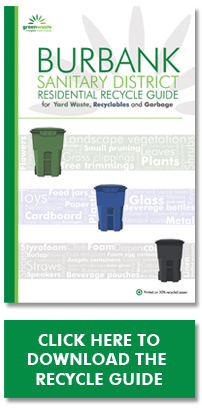Disposal Tips
Trash / Recycling
For detailed information on disposal of solid waste and recycling, see the GreenWaste Recycle Guide for the Burbank Sanitary District.
Sorting Guidance: Click here for Recyclables, Mixed Compostables, Yard Trimmings
Yard Debris / Street Sweeping
As of November 1, 2015, the Burbank Sanitary District will no longer provide street sweeping services to our residents. The BSD Board has evaluated the benefits currently provided by our street sweeping vendor and has decided to terminate sweeping services for the following reasons:
- Due to the drought, only reclaimed water can be used in street sweeping equipment. This requirement posed operational issues for our street sweeping vendor.
- Many vehicles are parked on the street during sweeping, making it difficult to clean all streets effectively.
- The types of street sweeping equipment used by our vendor may create more air pollution.
- The BSD is exclusively responsible for sewer operations and maintenance. Street sweeping is beyond the District’s preview or obligation. Note: Any money previously allocated or collected for street sweeping will now be redirected to our ongoing Capital Improvement Projects.
Please do not sweep yard dust and debris into the street. All yard waste should be placed in your waste, recycling or green bins, as appropriate, to help keep the street clean and keep debris from backing up storms drains.
Sewer Care
- Only the 3 P’s should be flushed down the toilet: Pee, Poop, and Paper! Please do not flush sanitary items, facial tissues or wipes of any kind… even if it says “flushable” on the package.
- Fats, Oils, or Grease (otherwise known as FOG) should never go down the drain. Small amounts of cooking fats can go in the trash, and recycled motor oil can be placed in free jugs provided by GreenWaste. Larger quantities of cooking oil or other automotive fluids are considered hazardous waste. To schedule disposal of large amounts of Fats, Oils, or Grease, please contact the GreenWaste Household Hazardous Waste Program team at 408-299-7300.
- Unused or unwanted medications should not be thrown away in the trash, or flushed or poured down the drain (even if the FDA tells you to so on their website). Please use a medication disposal service mail-in bag, available at your pharmacy, or visit one of the drop-off locations on this list: SCC Drop-Off Locations
- Please do not flush or pour excess chemicals down the drain, or dispose of them in your trash. Paint, solvents, and cleaning solutions are hazardous waste. For disposal instructions, please call the GreenWaste Household Hazardous Waste Program team at 408-299-7300.
- Soaps and cleansers that you use on your laundry (and on yourself) can all eventually end up in the Bay, and can be harmful to the ecosystem. Try to avoid any products with synthetic fragrances, alkylphenol ethoxylates, microbeads, and anti-bacterial soaps containing Triclosan. See links, below, for more information.
Additional Resources / Interesting Reading
- Guidelines for Fats, Oils and Grease (FOG): http://www.sanjoseca.gov/index.aspx?NID=1656
- Hazardous Waste Guidelines for UCSD Campus: http://blink.ucsd.edu/safety/research-lab/hazardous-waste/sewer.html (useful for anyone whose pipes, ultimately, lead to an ocean)
- Triclosan: http://www.ewg.org/research/pesticide-soap-toothpaste-and-breast-milk-it-kid-safe/triclosan-toxicity
- Microbeads: http://www.beatthemicrobead.org/en/science
